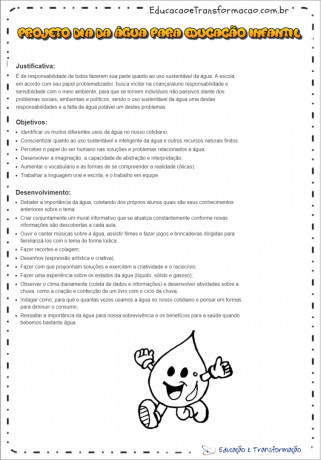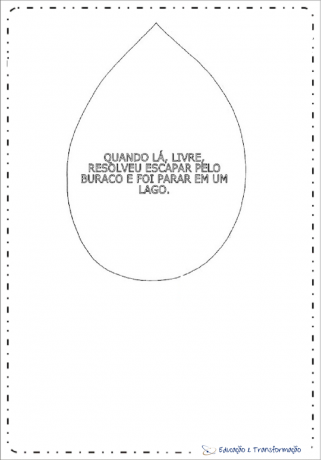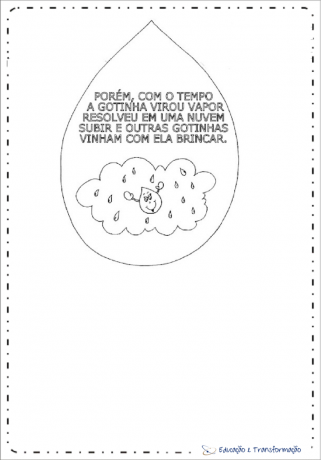
Check out these suggestions and templates ready for your Water Day Project, aimed at students of Early Childhood Education and Early Series. These are excellent suggestions for working on the importance of water.
Did you know that the World Water Day or Water's Day is celebrated annually in March 22?
We are going through a period when all the attention in the world is on the issue of water. An indispensable element for our life that is wasted every day in various places on the planet. There are places in the world where there is not as much water abundance as we have in much of Brazil and for this reason it is worth mentioning the world water day.
See also:
There are periods of extreme drought in the northeast that leave thousands of families in need due to water pollution and waste. was created then world water day to make people aware of the importance of this element.
Index
It keeps our body hydrated, helps transport substances, is an excellent solvent and regulates temperature, it helps in chemical reactions and, above all, it is where the electrical energy that supplies all homes is generated. in Brazil.
The planet has plenty of water, but only 0.75% is useful for consumption, such as in lakes, rivers and underground reservoirs.
And the amount of water is not distributed equally everywhere. Some receive in abundance and others almost nothing. In fact, in times of drought, who has never run out of water, in periods when it is necessary to ration water?
The un created the world water day and brought it on the agenda several times, as precious for the supply of the planet, animals, humans and plants.
Water belongs to everyone, there are no owners, despite being marketed by large beverage companies.
For years, large beverage companies have been buying water deposits, places with river sources, because they know that in the future water will become more expensive than alcohol and gasoline.
If we compare the price of a bottle of mineral water with the price of a liter of gasoline in some places that is sold, the water can have a value that surpasses general expectations. We are already living in a period in which water is already highly valued and recognized worldwide, and it should remain so for the next generation to have stability at this point.
In Brazil there are 11.6% of the world's fresh water, much of it distributed in the Amazon, where only 6% of Brazil's population lives. Due to irregular distribution, only 3% of the water is in the Northeast, and in some cities there is no such water.

Water Day Project – Water is life
More in: WATER DAY PANEL WITH MOLD

Water Day Project
The Leon Renault Municipal School team believes that values such as respecting what nature provides us must be passed on to children. We know that nowadays it is essential that education in an interdisciplinary way addresses the environment so that children know and value the laws of nature.
The project “Water: a Drop of Consciousness"has been developed to raise awareness among students about the use of water.
Evaluate the participation of students during the proposed activities, observe their actions and attitudes, evaluate oral and written productions and expose the work performed.
Source: Professor: Ivani Ferreira – https://professoraivaniferreira.blogspot.com.br/
Water Day Project
Start the project by talking to students, to record what they already know about the topic and the relationship they establish with their lives. Encourage the class to participate and record the students' prior knowledge on the proposed topic: “The water cycles”.
1st Day - Start the class with music: Chua, Chuagua, then comment the music, sing and dance. Raise hypotheses with questions about and the student's prior knowledge of the topic of the class.
Another suggested song is little mouse taking a shower, see the video below… talk about the importance of water for our hygiene and also about our body parts.
History
Tell the story 'The Plim Plim Droplet' and recount the story. Work on the subject, raising students' curiosity about the subject. Working with droplet puppets, illustrating a booklet and drawing in the classroom. Illustrate and comment on the drawings in the story. Classroom drawing display.
1 – The droplet Plim Plim, lived in a cloud together with millions of other drops, there she was very happy.
2 – One day a strong wind blew and the droplet couldn't hold on and fell, like a fine, fresh rain.
3 – She fell into a garden full of colorful flowers and was amazed by such beauty.
4 – Sliding over the sunflower, he discovered that it was the one that brought part of the plant's food and was very happy to help.
5 – She slipped down the stem until she reached the root, there she received all the thanks she deserved and even took a nap in the soft earth.
6 – The other day the sun came out very strong.
The droplet turned to steam and rose again to the sky, forming a very beautiful cloud. She was happy to have fulfilled her mission on earth.
Look:

Water Day Project for Early Childhood Education
It is everyone's responsibility to play their part in the sustainable use of water. The school, in accordance with its problem-solving role, seeks to encourage the child/student to be responsible and sensitive to the environment, so that they become non-individuals. liabilities in the face of social, environmental and political problems, with the sustainable use of water being one of these responsibilities and the lack of drinking water one of these problems.

Water Day Project for Early Childhood Education to print







Water Day Project – Water, let's save
All God has made beautiful and in due time; (Ecl.3.11ª). If we look at nature, we see that God did everything for his purpose; when he made the separation between land and water, (Gen.1.6, 7), He already knew the importance of water in our lives, both for food and for our daily needs. We should be grateful to God for all that He has given us, and this implies the care and preservation of His great work; as it is in Psalm 24:1, 2; of the Lord is the earth and its fullness the world and those who dwell in it. Because He sank over the seas and claimed over the rivers.
A child's knowledge is built in a movement of comings and goings, therefore, it is essential that teachers assume their role as mediators in the educational action. Mediators who carry out pedagogical interventions in monitoring the action and individualized thinking of children. Thus, the assessment will be carried out throughout the project, observing each student and their participation.
What did you think of the post “Water Day Project”? If you liked, don't forget to share with your friends on social networks and also leave your opinion in the comments.
Subscribe to our email list and receive interesting information and updates in your email inbox
Thanks for signing up.
